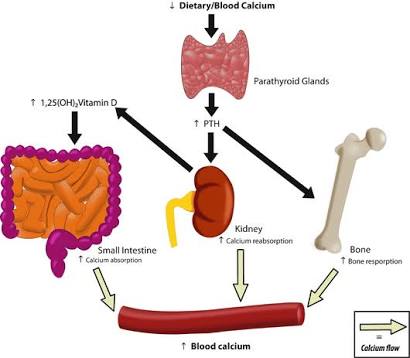Based on research, the global prevalence of urinary tract stones is approximately 4-20%.
In Taiwan, About 9.6% of people will experience urinary tract stones in their lifetime.
Since most stones contain calcium, many people intuitively believe that patients with urinary tract stones should restrict their calcium intake.
But is this really the truth?
Physiologically, when we restrict calcium intake, the following things happen:
↓ Calcium intake → ↓ Blood calcium concentration → ↑ Parathyroid hormone secretion → Calcium release from bones into the blood → Maintenance of blood calcium concentration

Did you notice?
The blood calcium concentration doesn't decrease due to reduced intake.
Instead, it leads to loss of bone calcium, resulting in osteoporosis!
Clinical statistics also confirm that patients with urinary tract stones not only have lower bone density but also a higher incidence of fractures!
Furthermore, research also confirms that a calcium-restricted diet does not effectively reduce the incidence of stones!
On the contrary, Individuals who consume more dietary calcium actually experience a 34-35% lower likelihood of stone formation compared to those who consume less!
Therefore, we understand that patients with urolithiasis should obtain sufficient calcium from their diet.
This is not only beneficial for preventing stones but also for preventing osteoporosis.
So, how much calcium should be consumed?
Both the European and American Urological Associations recommend a daily calcium intake of 1000-1200mg from "food".
Generally, men and premenopausal women should aim for 1000mg.
Men over 70 years old and postmenopausal women should supplement up to 1200mg.
In addition, some people worry about insufficient calcium from dietary sources and want to get calcium from supplements such as calcium tablets.
Dr. Huang would like to emphasize here that the impact of calcium supplementation on the body differs from that of dietary calcium.
Research has found that calcium supplementation may increase the risk of stones in older women.
Therefore, The American Urological Association recommends that if you intend to take calcium supplements, it is advised to consume them together with meals containing higher oxalate content (lunch or dinner).
Furthermore, this is an opportunity to dispel a misconception
Some people believe that consuming foods rich in oxalates along with calcium increases the formation of urinary calcium oxalate stones.
In reality, it's quite the opposite.
From a gastrointestinal physiological standpoint, when dietary calcium is sufficient, the excess calcium combines with ingested oxalates to form calcium oxalate, which is then eliminated through feces.
So, it doesn't lead to urinary stone formation!
By the way, if anyone wishes to learn more about dietary recommendations for urinary tract stones,
please refer to the previous articles on the blog: dietary considerations for stone patients
References:
https://www.auanet.org/guidelines-and-quality/guidelines/kidney-stones-medical-mangement-guideline
https://uroweb.org/guidelines/urolithiasis/chapter/metabolic-evaluation-and-recurrence-prevention
Effects of Dietary and Supplemental Calcium and Vitamin D on Stone Disease
Epidemiology of urolithiasis
https://pubmed.ncbi.nlm.nih.gov/8936716/
Epidemiology of urolithiasis in Asia
https://www.ncbi.nlm.nih.gov/pmc/articles/PMC6197415/
Epidemiology and treatment of inpatients urolithiasis in Taiwan
https://www.sciencedirect.com/science/article/pii/S1682606X16300421
Nephrolithiasis-associated bone disease: pathogenesis and treatment options
https://pubmed.ncbi.nlm.nih.gov/21124301/
PARATHYROID HORMONE AND DISORDERS
https://lms.su.edu.pk/lesson/866/parathyroid-hormone-and-disorders
Bone mineral density and fracture among prevalent kidney stone cases in the Third National Health and Nutrition Examination Survey
https://pubmed.ncbi.nlm.nih.gov/11585355/
A Prospective Study of Dietary Calcium and Other Nutrients and the Risk of Symptomatic Kidney Stones
https://pubmed.ncbi.nlm.nih.gov/8441427/
Comparison of dietary calcium with supplemental calcium and other nutrients as factors affecting the risk for kidney stones in women

